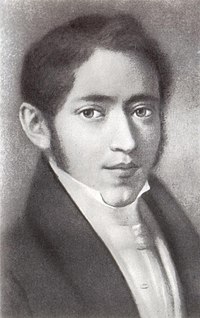This article may need to be rewritten to comply with Wikipedia's quality standards. (September 2023) |
This article needs additional citations for verification. (August 2013) |
Nikolay Ogarev | |
|---|---|
 Ogarev's portrait by an unknown painter, c. 1830. | |
| Born | Nikolay Platonovich Ogarev December 6, 1813 Saint Petersburg, Russian Empire |
| Died | June 12, 1877 (aged 63) Greenwich, England |
| Occupation | poet, historian and political activist |
Nikolay Platonovich Ogarev (Ogaryov; Russian: Никола́й Плато́нович Огарёв; December 6 [O.S. November 24] 1813 – June 12 [O.S. May 31] 1877) was a Russian poet, historian and political activist. He was deeply critical of the limitations of the Emancipation reform of 1861, claiming that the serfs were not set free, but had simply exchanged one form of serfdom for another.
Ogarev was a lifelong friend, fellow-exile and collaborator of Alexander Herzen on Kolokol, a newspaper printed in England and smuggled into Russia. In the summer of 1827, during a walk in the Sparrow Hills above Moscow, Herzen and Ogarev (both in their teens) made an oath not to rest until their country was free;[1] the oath reportedly sustained them and their friends throughout many crises of their lives at home and abroad and was described in E. H. Carr's The Romantic Exiles. The place of the oath is now marked with a monument.
- ^ Walicki, Andrzej (1979). A History of Russian Thought From the Enlightenment to Marxism. Stanford University Press. p. 127. ISBN 0804711321.